- Home
- Joy Dettman
The Silent Inheritance Page 6
The Silent Inheritance Read online
Page 6
That pipeline had something to do with water or sewerage pipes. For kilometres it cut across the land on an angle, just this stretch of vacant land with houses on either side. Parts of it had been turned into kids’ parks, with slides and swings and stuff. The part Marni walked through had trees, not large enough trees for a man to hide behind, though some of the bushy clumps would hide one.
And she saw something, saw movement near the fence, and for an instant her legs wanted to run, or they did until she saw the edge of a school uniform and heard Samantha’s laugh. Some people had a signature laugh.
Marni left the track to see what she was doing, then wished she hadn’t. There were four of them, crouched low, their backs to the paling fence, sharing one cigarette, two boys Marni had known forever and a girl she didn’t know who had a bunch of blonde hair half a metre long and a fancy mobile.
Obsessed by them, and in particular by iPhones, which did everything a camera or a computer could do, she joined the group.
‘Can you take a photo of us?’ the new girl asked. She had an American accent.
‘Probably,’ Marni said, eyeing her as the girl offered her phone. Marni put her schoolbag down to hold it, to feel the weight of it, the shape of it, while listening to instructions on how to make it work.
She got their cigarette in one of the boy’s hands in the first shot, so had to take a second photograph because the new girl wanted to send it to her father.
‘Her parents are divorced,’ Samantha said. ‘He’s an American.’
Marni was more interested in the iPhone, now back in its owner’s hands. She stood close, watching how she sent that photograph flying over the ocean to America.
‘How long have you been in Australia?’ she asked.
‘I was born in Sydney but we lived in Kentucky until I was ten, when my folks split and Mom brought me back to Sydney – then down here.’
‘She’s not allowed to contact her father,’ Samantha said.
‘Why not?’
‘I’m a hostage in Mom’s war game,’ the girl said. ‘What’s your name?’
‘Marni Carter. Who are you?’
‘Danni Lane.’
Marni turned away and picked up her bag, knowing who’d bought that iPhone. Lane wasn’t a common name, not like Smith. She knew that Barbara Lane had divorced her American husband, that she’d transferred down from Sydney to steal Marni’s mother’s promotion.
Walked on then, thinking, I’m a hostage in Mom’s war game, thinking how much better it was to have been born posthumously, better too to have your father run off with a girlfriend than having parents fight over who got custody of you.
HOME VIDEOS
The finding of Monica Rowan’s body had pushed the Swan trial from the headlines and Ross Hunter’s mind, but not from the courts. He’d been sworn in at one thirty, had cleared the courtroom by one thirty-five and had since been sitting, cooling his heels while fat Freddy played his games behind closed doors.
After Ross’s last run-in with Freddy, he’d watched a wife murderer walk, and if that clever little bastard got Cory’s grandparents’ home videos chucked out, Michael Swan would walk.
His girlfriend, pregnant with a possible baby Swan, had retracted her statement, and without it, all they had were those home videos. The grandparents had captured little Cory Martin’s brief life story and Ross had seen them play it out on a modern television in their lounge room.
They’d raised him for the first eight months of his life, videoed a newborn not doing much, trapped a gurgling three month old wearing a Hawthorn football sweater, beanie and socks that Grandma had knitted. They’d caught a chubby two-toothed eight month old, crowing about how well he could crawl. Then the mother had taken Cory from his grandparents’ care, and there’d been no further record of that brief life until his first birthday.
They’d videoed a rocking horse, a chocolate cake with one candle, and a wide-eyed matchstick boy who hadn’t smiled for Grandpa’s camera. They’d caught a bruised leg and backside before the screaming started. Not Cory’s. Grandma’s and the boyfriend’s. There was a bare two seconds of it before someone turned off the camera.
‘Did you report this?’ Ross had asked the couple.
‘We rang up a woman and I told her we had to get Cory away from those two or they’d kill him,’ Grandma said.
‘She did nothing,’ Grandpa said.
‘So we went around to where they were living to get him ourselves, and Mick went stark raving crazy. He attacked us.’
‘We reported what he’d done to the police,’ Grandma said. ‘But they don’t do anything when it’s a family matter.’
Ross had done something that night. He’d arrested Swan and charged him with murder, on the strength of those home videos. They’d found a spot of Cory’s blood on one of that bastard’s shoes, but later. They’d found a dent in the hovel wall in the shape of an infant head – or a rounded bowl – or a bowling ball.
Without the home videos Freddy would make mincemeat of Grandma and Grandpa, and pretty boy Swan would walk, and if that bastard walked, Ross was running, taking off around Australia in his Commodore and leaving this shit behind him.
He checked his watch. Ten after two. Time moved more slowly within the great halls of justice. Closed his eyes and considered a tent, or a little fold-down van. A van maybe. He could damn near see himself heading out on the Hume Freeway—
Which switched his mind back to Monica.
They’d found his note. He always sent them a note. They knew the brand of shampoo he’d used on Monica’s hair, where he’d bought the outfit she’d been found in. Hadn’t found much else.
A careful, evil bastard, he drugged those girls, drowned then bathed them, shampooed their hair, brushed and tied it in pigtails with big pink bows and dressed them in brand new near-identical outfits, white socks, white briefs, pink t-shirts and short denim skirts. All the same. Then he tied them into identical garbage bags and tossed them from a moving vehicle to the side of a freeway.
The timing of the abductions suggested he was employed. All four had been taken on a Friday. Three of the four were found in the early hours of Monday mornings. Not Penny. A council worker had found her body out the back of Dandenong in the shrubbery growing beside the Monash Freeway, where it might have lain for two weeks.
Ross sighed and thought of the first of the victims, little Nancy Yang, a tiny dot of a girl, brought by her parents to Australia so she might have a better life. The investigation into her death had concentrated on the Asian community. Not until Penny Matthews was found had they known they’d had a child killer roaming the streets of Melbourne.
Then Heidi, taken from a busy shopping centre. She’d been caught on security video in the centre, and not one of them had shown her leaving it, either alone or with her killer. That bastard had got her out of there somehow. They’d found her dead six weeks later.
He shopped at Target. The outfits found on three of those girls had come from that store. All four had been drowned in tank water. In the last three, forensic had found high concentrations of diazepam.
But not in little Nancy. They’d found traces of penicillin in her, found inflammation in her lungs too. That murdering bastard had fed her the penicillin, wanting her alive longer to torment longer. He’d kept Monica alive for two months and two days.
Until the American case, that crazy Latino who’d kidnapped and kept three teenage girls as sex slaves, Ross had seen the killer holed up in a weekend shack. The Latino had changed his thinking. He’d lived within the community and managed to keep his victims silent for ten years while going about his own life.
The bathing of those girls, the shampoo, suggested a house, and since the drought, half of the houses in Melbourne had rainwater tanks. Ross’s sister had one. She’d kept her garden greener than her neighbour’s. Ross shook his head, and got his mind back to Monica, back to the note, addressed to The Hunters.
How much less shall I answer him, and choose my
words to reason with him. Though I were righteous yet would I not answer, but I would make supplication to my judge.
Taken alone, it suggested a God freak. They had four notes. The one he’d sent with Heidi had mentioned display boards, which had suggested to some that he might have been a collector of something.
Old cars maybe – old Holdens. To date they’d had no luck in locating his HG Holden on camera. Early days yet.
The wide pink satin ribbon he used on all four of his victims’ hair flagged him, or his wife, mother, grandmother, as a hoarder. Johnson’s team had done the rounds of haberdashers looking for that ribbon. A Lincraft employee identified it as discontinued stock. The killer had access to a roll of that discontinued stock, to a pair of sharp scissors, a measuring tape. Each of those hair ribbons had been cut to sixty centimetres in length, and cut on an angle, to minimise fraying.
A woman was more likely to cut ribbon in that way than was a male – unless he’d been in the haberdashery trade. The outfits, not too big, not too small, and the fact that he hadn’t raped those girls, suggested to some that the killer was female.
A female behind the wheel of a forty-year-old Kingswood Holden? Possible, but Ross saw the killer as a male, a high achiever who may not have reached the heights he believed he’d deserved.
‘A bloody lawyer,’ he muttered. He didn’t like lawyers. A cop worked his guts out to get a murderer into court, and along came some clever little bastard to put him back on the street. There had to be a better way than the jury system.
He glanced again at the courtroom door, knowing that fat Freddy couldn’t allow those home videos to be viewed by the jury, that no one could view them and not come back with a guilty verdict.
The truckie who’d found Monica refused to be shaken on what he’d seen that night on the Hume Freeway. A light-coloured, probably white, early seventies Kingswood Holden.
‘It braked, swerved to the right across two lanes, then took off like a bat out of buggery, its passenger-side door hanging open,’ he’d said. ‘For some reason, I thought wagon.’
The truckie could have seen some old codger with a faulty door, who lost control of the wheel while reaching to close it, or had seen that bag on the road and swerved to miss it. Ross had put those theories to the truckie, who’d come back at him with his own questions.
‘Then why take off? Why not pull into the emergency lane, close his bloody door and walk back to see what was in that bag? I knew who was in it when I saw it disappearing beneath the truck. Anyone who watches the six o’clock news would have known young Monica was in that bag.’
He was right about that. Her abduction had been well reported, and her father had done what he could to keep her name in the news. A strong man, Monica’s father. He’d broken when they’d asked him to identify his daughter. Back in the old days, women had been considered the weaker sex. Not these days. His wife had identified their girl.
A cop learned to handle death or he got out of the game fast. Ross had never learnt to handle the death of a child. Each one became personal. At one time he’d wanted kids, six of them. The job had killed that idea.
And he needed a smoke and glanced towards the exit, considering a quick puff. He wanted Swan off the street more – and he didn’t want to front up here again tomorrow.
Weather conditions seemed to have played a role in how long those girls had survived. That was a definite. Nancy, the killer’s only winter child, had lived for ten days; Penny, taken in autumn, might have lived for fifteen. Heidi, taken in midsummer, had survived for six weeks, and Monica, taken in mid-December, had made it through to February.
Given a motive and a fresh crime scene, good police work usually did the rest. The killer gave them no crime scene, no motive, no pattern to his method of taking those girls and no area to concentrate on.
He’d taken all four on Friday afternoons or evenings. Nancy had run out of her father’s Footscray corner shop to get a library book she’d left in the car, some time between seven and eight. Penny had left her Doncaster school at three thirty to walk two blocks home. Heidi disappeared from a shopping centre at around four o’clock and Monica from a quiet residential street in Glen Waverley at eight on a summer evening. Other than abrasions around Nancy’s ankle, any injuries to the bodies had been post mortem. He hadn’t marked the others – he or she. Again Ross pondered the she. Nancy could have been picked up and carried by a midget. Not Monica. She would have been capable of fighting off the average woman.
Hours had been spent perusing porn sites on the internet. If the killer was into photography, his artwork hadn’t turned up on the web. He had access to a computer. His notes were computer generated, laser printed on A4 paper he folded small before placing them into his victims’ mouths. An evil, malevolent ghost, he haunted Ross’s days.
And fat Freddy was wasting this one.
Not waste to him. Life’s blood to him.
Ross glanced at his watch. Freddy had now been arguing for near on an hour. If it continued much longer, the judge would send the jury home. Like Ross, they were locked out of the courtroom.
Twelve strangers, each toting his or her own bias, thrown together for as long as it took, a ridiculous system in an era when information on any subject could be found on a mobile. The daily newspapers were available online, or their headlines were. Most readers only had time to read the headlines. Newspaper sales were down – and so they ought to be. Newspaper editors were fickle bastards. They’d been in love with Cory Martin for a week, after he was dead. They were in love with his murderer now, who came up well on camera.
Looks were important. Women starved themselves to look good, paid surgeons a fortune to chop off a bit here, suck out a bit there, inject a bit. Ross’s brow could use a few shots of botox. He was getting a headache. A smoke would fix it.
A lot of years ago, a girl he’d almost loved, Janice, had told him he’d looked like Robert De Niro. Could have married her.
He’d had his mum back then. Lost her two years ago. She hadn’t gone slowly, as the elderly were supposed to. She’d been full of beans when he’d left for work that morning and missing when he’d come home. He’d found her by torchlight, dead beneath her clothes line, her laundry basket beside her.
Lost his mother’s Hawthorn house five months later. His sisters, eight and ten years his junior, had needed cash more than the memories. They cleared 1.2 million on that house, a bulk of money, even when split three ways. Could have bought a unit with it. Hadn’t wanted to own anything, had wanted to be free to cut and run – and the longer they left him sitting out here, the more he felt like doing it, and the more frequently his hand moved to his pocket to fondle his packet of smokes.
Not so long ago there’d been ashtrays here. Not any more. Smokers congregated where they could these days. He’d had a few interesting conversations with companion lepers. Six months ago he’d begged a light from the mother of that wife killer when they’d shared a sheltering courthouse wall one windy day. She was a nice woman too, though he’d wanted to put a boot in her backside when she’d walked away celebrating with her murdering son, all thanks to fat Freddy.
Before presenting himself here today, Ross had snatched a smoke in the shade of that same wall and been joined there by a newshound he’d known all his life, Les, born with ulterior motives.
‘Is he gunna walk, Ross?’ he’d greeted him.
‘Ask fat Freddy,’ Ross said.
‘Anything new on the Kingswood wagon?’
‘Thanks to you lot, we’ve had callers from Mildura to Moe dobbing in their neighbours,’ Ross said, knowing those words would turn up in tomorrow’s headlines – but from an unnamed source.
And thank Christ, they were calling his name.
THAT TUESDAY
Sarah blamed Barbara Lane for her sore throat. She blamed David Crow, and the stress of attempting to get his payroll done with his sulking mistress stuck to her left elbow and making it obvious that she was there under sufferance.
/>
The Crows owned whitegoods stores in five states. They had small offices in Perth and Sydney, but ran their entire company out of their Melbourne office. The payroll was huge, as were the figures Sarah played with each day. She didn’t make mistakes, but it took her full concentration not to add an extra zero or lose one. The computer’s accounting system was brilliant. It did most of the work, but her attempt to teach it to Barbara was wasted effort.
If there was anything behind her perfect façade, Sarah hadn’t seen it. She was smooth hair, perfect makeup, gorgeous fingernails attached to useless hands – like a mannequin in a boutique window, dressed each day to display another dazzling outfit, always cool, relaxed, beautiful, but lifeless.
Sarah wasn’t cool. The office was chilled to a comfortable twenty-three degrees, and she was burning, and each time she used her voice, her throat felt as if someone had taken a rasp to her tonsils.
‘I asked you to write it down!’
‘Go,’ Sarah said, and the senior payroll/accounts officer actually looked her in the eye, coolly.
‘Go!’
Barbara understood her the second time, or perhaps understood the hand Sarah flung with the word. She went, not to her office but to Crow’s. Ten minutes later, the huntsman spider crawled on Sarah’s shoulder.
Bob Webb was paid well to manage Crow’s office and Sarah knew to the last cent how much he was paid. Maybe he earned it.
‘She needs to learn the job,’ he said.

 The Hope Flower
The Hope Flower Trails in the Dust
Trails in the Dust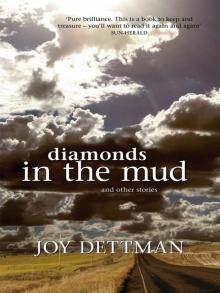 Diamonds in the Mud and Other Stories
Diamonds in the Mud and Other Stories Moth to the Flame
Moth to the Flame The Tying of Threads
The Tying of Threads Wind in the Wires
Wind in the Wires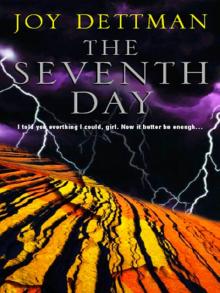 The Seventh Day
The Seventh Day Thorn on the Rose
Thorn on the Rose Jacaranda Blue
Jacaranda Blue Mallawindy
Mallawindy Ripples on a Pond
Ripples on a Pond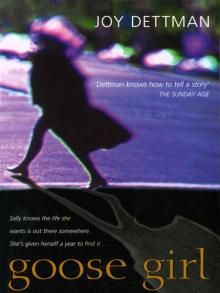 Goose Girl
Goose Girl The Silent Inheritance
The Silent Inheritance Henry’s Daughter
Henry’s Daughter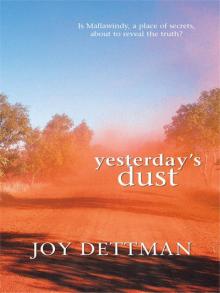 Yesterday's Dust
Yesterday's Dust Pearl in a Cage
Pearl in a Cage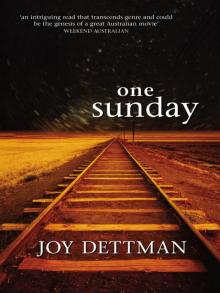 One Sunday
One Sunday